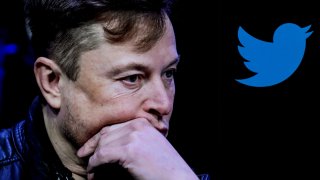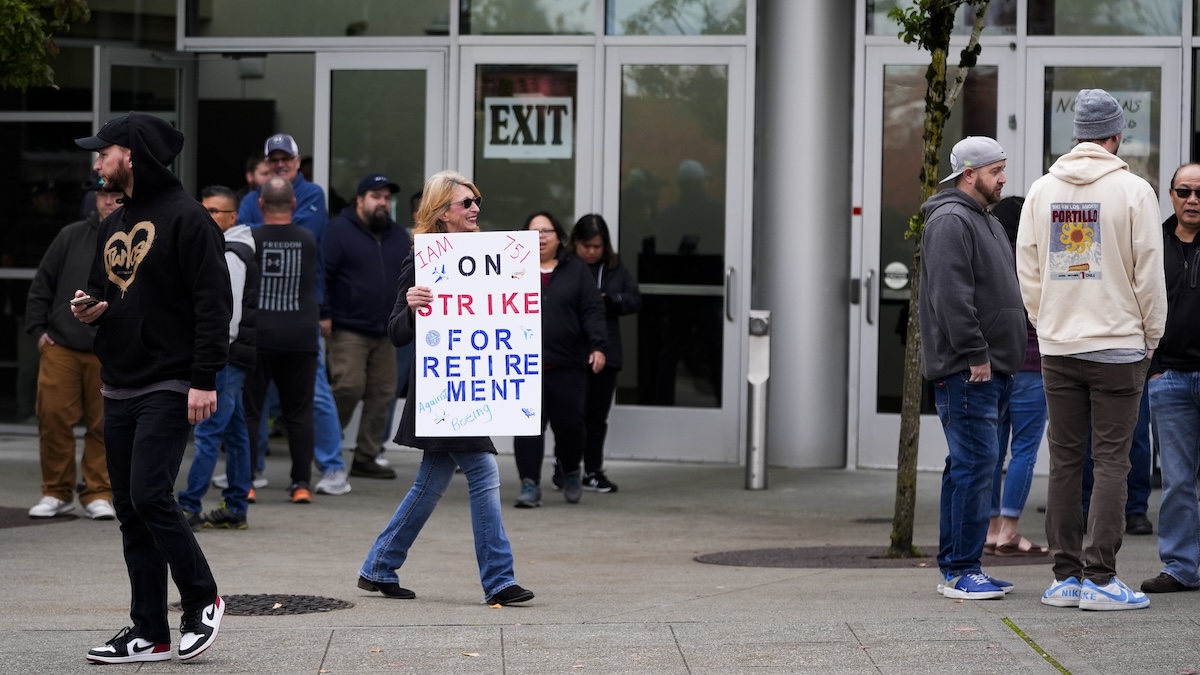
Millions of Twitter users asked Elon Musk to step down as head of Twitter in a poll the billionaire created and promised to abide by.
When the poll closed Monday, however, it still wasn't clear if there would be a new leader for the social media platform, which has grown more chaotic and confusing under Musk's leadership with rapidly vacillating policies that are issued, then withdrawn or changed.
Among those in the “go” camp was almost certainly Tesla investors who have grown tired of the 24/7 Twitter chaos which they say has distracted the eccentric CEO from the electric car company, his main source of wealth.
Get top local stories in DFW delivered to you every morning. Sign up for NBC DFW's News Headlines newsletter.
Musk also used his shares in the company to partially fund the acquisition of Twitter.
Shares of Tesla are down 35% since Musk took over Twitter on Oct. 27, costing investors billions. Tesla's market value was over $1.1 trillion on April 1, the last trading day before Musk disclosed he was buying up Twitter shares. The company has since lost 58% of its value, at a time when rival auto makers are cutting in on Tesla's dominant share of electric vehicle sales.
Shares had been up 3% before the market opened with the poll suggesting there was a growing chance of Musk's exit from Twitter, but they fell 2.2% with no word from Musk, hitting a new two-year low of $146.87 Monday.
U.S. & World
“This has been a black eye moment for Musk and been a major overhang on Tesla’s stock, which continues to suffer in a brutal way since the Twitter soap opera began,” Wedbush analyst Dan Ives wrote Monday.
Musk's stint as Twitter CEO appears to be ending, which would be a major positive for Tesla stock. Ives wrote, and “a major step forward with Musk finally reading the room that has been growing frustration around this Twitter nightmare.”
The billionaire Tesla CEO Musk attended the World Cup final Sunday in Qatar, where he opened the poll. After it closed 12 hours later, there was no immediate announcement from Twitter or Musk, who appeared to be flying back to the U.S.
More than half of the 17.5 million respondents voted “yes" in answer to Musk's Twitter poll asking whether he should step down as head of the company.
Musk has taken a number of unscientific polls on substantial issues facing the social media platform, including whether to reinstate journalists that he had suspended from Twitter, which was broadly criticized in and out of media circles.
The polls have only added to a growing sense of tumult on Twitter since Musk bought the company for $44 billion, potentially leaving the future direction of the company in the hands of its users.
Among those users are people recently reinstated on the platform under Musk, people who had been banned for racist and toxic posts, or who had spread misinformation.
Since buying Twitter, Musk has presided over a dizzying series of changes that have unnerved advertisers and turned off users. He's laid off half of the workforce, axed contract content moderators and disbanded a council of trust and safety advisors. He has dropped enforcement of COVID-19 misinformation rules and called for criminal charges against Dr. Anthony Fauci, the top U.S. infectious disease expert.
Musk clashed with some users on multiple fronts and on Sunday, he asked Twitter users to decide if he should remain in charge, acknowledging he made a mistake in launching new restrictions that banned the mention of rival social media websites.
The results of the unscientific online survey regarding whether Musk should remain as top executive at Twitter, which lasted 12 hours, showed that 57.5% of those who voted wanted him to leave, while 42.5% wanted him to stay.
The poll followed just the latest significant policy change since Musk acquired Twitter in October. Twitter had announced that users will no longer be able to link to Facebook, Instagram, Mastodon and other platforms the company described as “prohibited.”
That decision generated immediate blowback, including criticism from past defenders of Twitter's new owner. Musk then promised that he would not make any more major policy changes to Twitter without an online survey of users.
The action to block competitors was Musk's latest attempt to crack down on certain speech after he shut down a Twitter account last week that was tracking the flights of his private jet.
The banned platforms included mainstream websites such as Facebook and Instagram, and upstart rivals Mastodon, Tribel, Nostr, Post and former President Donald Trump's Truth Social. Twitter gave no explanation for why the blacklist included those seven websites but not others such as Parler, TikTok or LinkedIn.
A growing number of Twitter users have left the platform under Musk, or created alternative accounts on Mastodon, Tribel, Nostr or Post, and included those addresses in their Twitter profiles.
Musk has advocated for free speech on Twitter, but shut down the jet-tracking account, calling it a security risk. He used that to justify Twitter's decision last week to suspend the accounts of numerous journalists who cover the social media platform and Musk, among them reporters working for The New York Times, Washington Post, CNN, Voice of America and other publications. Many of those accounts were restored following an online poll by Musk.
The Washington Post’s Taylor Lorenz was suspended over the weekend after requesting an interview with Musk in a tweet tagged to the Twitter owner.
Sally Buzbee, The Washington Post's executive editor, called it an “arbitrary suspension of another Post journalist” that further undermined Musk’s promise to run Twitter as a platform dedicated to free speech.
“Again, the suspension occurred with no warning, process or explanation — this time as our reporter merely sought comment from Musk for a story,” Buzbee said. By midday Sunday, Lorenz's account was restored, as was the tweet she thought had triggered her suspension.
Musk was questioned in court on Nov. 16 about how he splits his time among Tesla and his other companies, including SpaceX and Twitter. Musk had to testify in Delaware’s Court of Chancery over a shareholder’s challenge to Musk’s potentially $55 billion compensation plan as CEO of the electric car company.
Musk said he never wanted to be a CEO of any company, preferring to see himself as an engineer.
In public banter with Twitter followers Sunday, Musk expressed pessimism about the prospects for a new CEO, saying that person “must like pain a lot” to run a company that “has been in the fast lane to bankruptcy.”
“No one wants the job who can actually keep Twitter alive. There is no successor,” Musk tweeted.



